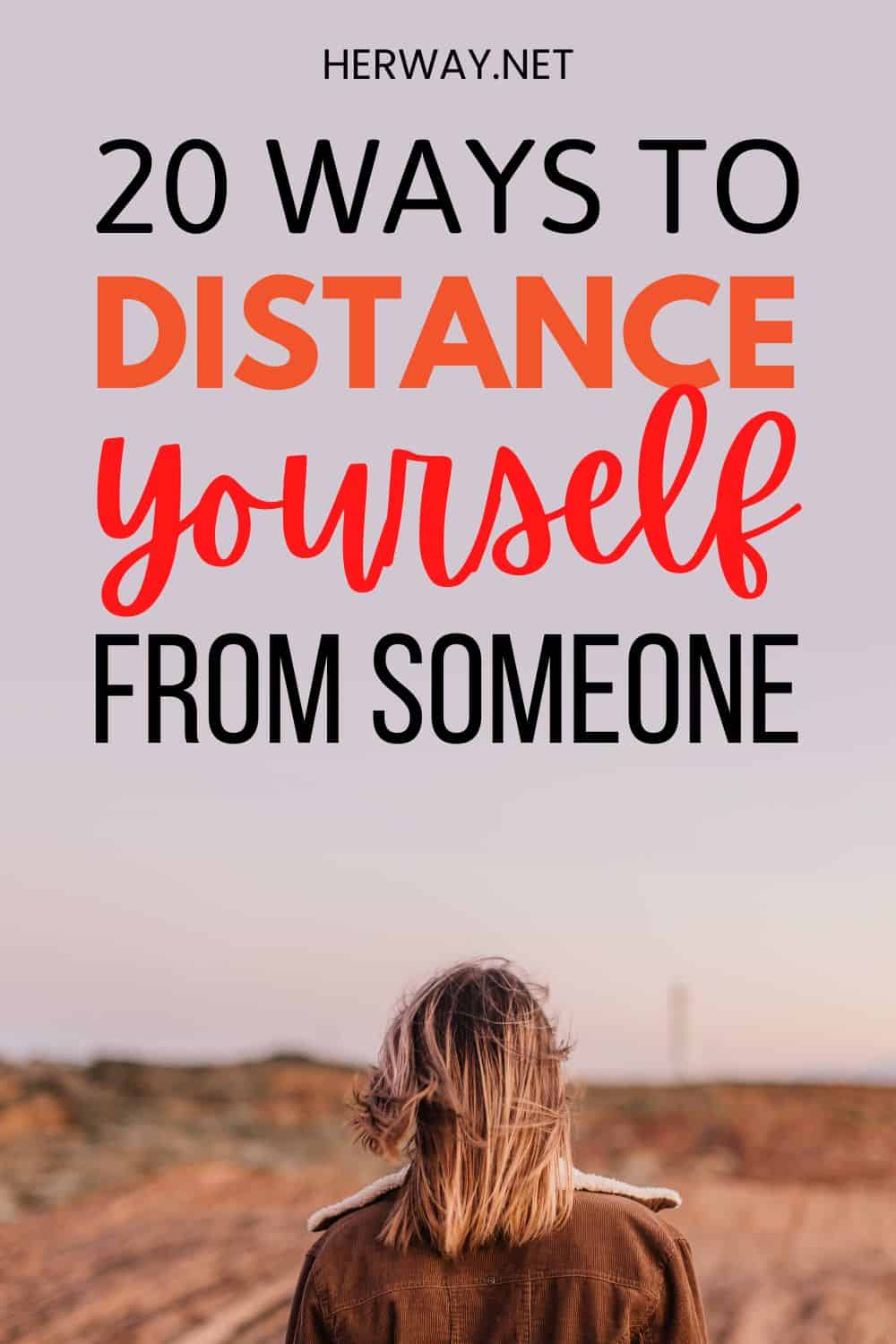How To Distance Yourself From Someone The Easy Way
Ending a romantic relationship is sometimes easier than ending a friendship. Unless you choose to cheat, most of the time, you’re with one person, and you know you can’t really find a healthy relationship until you leave.
Most people break up with their partners when they want to end a romantic relationship, yet it doesn’t even come to mind that you can get out of other kinds of relationships in the same way. When you’re unhappy in a friendship, you can get other friends without moving on, so you stay in a relationship that doesn’t work.
Besides, you might be trying to leave a relationship different from a friendship where there’s nothing left.
It might be a co-worker who annoys you and ruins your day at work or an entitled family member who doesn’t understand that you don’t have to obey them. It might be someone you worry about too much or simply someone you just don’t like being around.
Let’s see how to distance yourself from someone toxic and what to do when you don’t want to hurt the other person, you don’t want drama, or you don’t want to burn bridges.
How To Distance Yourself From Someone In Your Life

How do you get out of a friendship with someone? Usually, you let it fade away on its own – this is indeed the easiest way, and you’ll see how to do it – but sometimes, you need to explicitly end things.
It might be someone you still care for, but you don’t want them in your life anymore for some reason, or someone you have to see on a daily basis, so you can‘t really avoid them.
For example, when you want to end a friendship that was once important and you want to honor what you used to have, or when you need distance from a family member who asks too much from you, letting it fizzle out on its own might not do.
Whatever you think you need to do, your mental health must be a priority – if someone isn’t good for you, letting them go is the only way to move forward.
1. Make sure you really want to do this
First of all, don’t do anything unless and until you’re sure. Don’t call up a friend and break up with them on a whim. Deciding to end a friendship isn’t easy, and the reasons aren’t always simple. If you rush into it just because they annoyed you, you might regret it.
Think about your life without this person in it: is it better without them? Carefully consider your options and only take action when you’re sure.
2. Prepare
Once you’ve decided that it’s over, you must mentally prepare to move on. First, create distance on your part and make it easier on yourself. Start by reducing interactions with them, and make yourself unavailable more often.
Strengthen your other relationships so you’re not tempted to go back when you’re lonely or bored. Get rid of memories and mementos that might make you falter because of nostalgia. Stay strong by reminding yourself why you’re doing this.
3. Create physical distance
Return any of their stuff you might have and restrict access as much as possible. Stop making plans with them and stop reaching out first – no phone calls and no casual texting. Take a long time to reply to their text messages when they reach out.
Set limits and try to ween yourself from contact. Approach this the same way you would enforce the ‘no contact rule’ when breaking up with a partner.
Stay away from them as much as possible. By keeping a physical space, you’ll be able to distance yourself slowly, which is the easiest way to do it.
4. Create emotional distance
It’s not unusual to feel guilty about leaving someone you can’t be friends with. You might feel like this, especially if they haven’t done anything specific you could pinpoint as a cause for wanting to distance yourself.
Remind yourself why you’re doing it, and make a clean break. Lower your expectations of the relationship and reduce your interactions to a minimum. Don’t talk to them about personal stuff – only speak to them on a surface level when you have to.
Sometimes neglect and slowly becoming less and less available might be enough to distance yourself from someone.
Steps 1–4 from this list are enough if you want to let it happen naturally, but if you don’t want to distance yourself quietly, there are other things you can do.
5. Be kind, honest, and polite

Sit down with the person you want to end things with and talk to them. Approach this like a breakup, but think of it as an amicable one. Openly tell them what’s going on and be respectful. Make sure to tell them it’s over directly, but don’t pick a fight.
When talking to them, focus on what you need right now, not on their flaws. Let them know that you’re doing this for yourself. Try to leave the door open for the future even if you don’t intend to reconcile with them.
6. If they try to change your mind or argue, don’t engage
The other person might be unwilling to accept it, especially if they have a toxic personality. In this case, standing your ground isn’t easy, but don’t let them convince you to change your mind.
If you make this decision after considering it carefully, they won’t be able to change your mind with anything they say. Arguing with you about it is disrespectful and a sign that they care for you.
7. Surround yourself with support
You need support after ending things with a friend the same way you would when breaking up with a romantic partner. Surround yourself with your close friends and family to help you get over it.
Having a support system is helpful in making you stick to your decision and moving on much easier and faster.
8. Keep yourself busy
Focus on your hobbies and passions to keep yourself distracted instead of dwelling on and questioning your decision. If the person you’re distancing yourself from used to be a close friend, this situation might be as difficult as breaking up with a significant other. It’s okay to need time and distractions to get over it.
9. Accept that you might lose other people
If you and the person you’re distancing yourself from are family or have mutual friends, some of them might not see your point of view and decide to choose sides. Some might try to persuade you to change your mind, especially if you’re related.
Let them know that you don’t appreciate meddling and that you have your reasons for wanting to distance yourself.
10. Remember that you don’t have to justify yourself to anyone

The person you want to distance yourself from or other people in your life might want you to explain what’s going on. It’s fine if you want to tell them, but keep in mind that you chose this for your well-being, and you don’t owe it to anyone to tell them why.
If you feel discouraged because you’re getting questions and demands from all sides, tell yourself, “This is my life, and I’ll live it the way I want to.” This isn’t selfish – it’s healthy.
Boundaries must be respected in healthy relationships, and those who make you question your choice to make yourself a priority are violating them.
11. Take your share of the responsibility
Relationships are about what’s between people, so how they turn out depends on everyone involved. The relationship you’ve decided to end was influenced by you as much as the other person.
Don’t blame everything on them – even if they are toxic, take responsibility for letting yourself stay involved.
Also, consider that if a lot of your relationships don’t work, it might be something that you’re doing. If you find everyone irritating, or if you feel like you’re often treated unfairly, consider examining your feelings and behavior.
Sometimes there are underlying issues that make relationships difficult, and until you deal with them, your relationships, both romantic and platonic, will suffer.
12. Forgive the other person
A healthy way to move on is to choose to forgive the other person for whatever they did wrong. Accept that it happened and how it affected you, but make a choice to stop dwelling on it and forgive them.
Forgiveness doesn’t mean you have to let the other person back into your life. All it means is that you’re getting rid of negative feelings that hold you back. If you keep thinking about how they hurt you, you’re still letting them hurt you.
Forgive them for your own sake.
13. Stop communicating with them
It might not be necessary to block them unless they decide to reject your decision or if you think you might be tempted to contact them despite yourself.
Try to make communication difficult or impossible. Ask mutual friends or family members not to talk to you about them and unfollow their social media accounts.
Getting a notification from them on an app might make you fall into a habit of liking their posts or replying to their attempts to contact you, so it’s best to make sure you can’t.
14. Avoid places they frequent for a while
Just because you stop being friends with someone doesn’t mean you don’t want to see them ever again, but at first, it might be best to stay away. If you know they’re going to be somewhere, decide to keep your distance for your own sake.
Seeing them might make you fall back into the habit of talking to them, which defeats the purpose of your decision, so by avoiding them, you’re helping yourself stay strong.
If you’re unable to stay away because you go to school or work together and you have to see them, check out the section below that talks about this.
15. Focus on healing

Ending things with someone who used to be your best friend is sometimes as difficult as ending things with a significant other. Do something that helps you heal and stay positive.
Be kind to yourself at this point and let yourself grieve the relationship that doesn’t exist anymore. Think about it this way: your relationship had its place and time, and now it’s time for you to move on.
16. Give it time
Distancing yourself is difficult at first, especially if you were very involved with the other person. Things get easier with time, and it becomes easier to let go the more consistent you are about staying away.
You might be missing your friend today, but you still know that what you’ve done is for a good reason. If you persevere, in a while, you’ll be fine.
17. Get out there and meet new people
Making new friends might be the last thing on your mind at the moment. Don’t think of it as finding a ‘rebound friendship’ but having the opportunity to expand your social circle now that you’re not worried and anxious because of your former friend.
18. Seek professional help if you need it
Wanting a healthy relationship isn’t only limited to your love life. Taking steps to make sure you’re surrounded with positivity might prove to be a challenge.
If you feel like you need help dealing with it, counseling is invaluable. Someone with an outside perspective is able to shed light on things you can’t see because of how emotionally involved you are.
19. Define new boundaries
Learn from this relationship, and recall what it is that this person did wrong. This will help you figure out what’s important to you and what you can’t accept.
When you figure out your boundaries, communicate them and let people know if they cross them.
Nothing is set in stone, however. Boundaries can change and move. Things that didn’t bother you yesterday might be a problem today, so don’t be afraid to let people know.
For example, if you used to be fine with people visiting unannounced, but you don’t want it anymore, some people might ignore you when you tell them to call ahead. When you let people know that something isn’t okay, refuse to accept their disrespect just because it was okay in the past.
20. Be consistent
Consistency is essential for success in anything, even keeping your distance from someone.
If you flip between talking to them and not talking to them, you’re setting yourself up for failure. You’ll never get used to not having them in your life if you keep hurting yourself by associating with them.
Stay strong and consistent, and soon enough, you’ll be able to move forward without sparing a second thought for this person.
How To Distance Yourself From Someone Toxic

Choosing to step away from a toxic relationship is an act of self-love, but it might be hard if you still have some feelings for the other person or if you can’t really avoid them.
Sometimes you need to get over a friendship the same way you’d get over a romantic breakup. Deciding how to distance yourself from someone who’s making your life miserable comes down to two choices:
1. If you’re done and don’t want anything to do with this person, you can simply cut them off. Choose to tell them what’s going on or ghost them, but remember that you don’t owe them an explanation unless you want to give them one.
If this person is abusive, get out any way you can, making sure you stay safe.
2. You can follow the tips above and approach it as you would a relationship with someone you don’t want to hurt if you want to be kind. It’s best not to get involved too much, however, because toxic people tend to look for ways to prolong drama.
How do you know someone’s behavior is toxic?
• They hurt you mentally, emotionally, or physically.
• They make you feel unsafe, afraid, or uneasy.
• They make you feel invisible, bad about yourself, or manipulated.
• They get you into trouble or complicate your life.
• They don’t respect your boundaries, not even when you try to enforce them.
• They never acknowledge their mistakes and never apologize.
• They isolate you from your loved ones or damage your other relationships.
• They hold you back from achieving what you want and becoming who you want to be.
• They have a negative effect on your life.
RELATED: 81 Most Encouraging Toxic Relationship Letting Go Quotes
Why Distance Yourself From Someone In Your Life?

Deciding to distance yourself from someone isn’t done lightly. Even if you haven’t given it much thought consciously, something about them is bothering you enough to want to end things.
It’s important for your self-esteem to put your needs first. You don’t have to stay stuck in a toxic friendship any more than you’d have to stay in a toxic romantic relationship.
For example, if a friend hurt you and you forgave them, but you don’t want them in your life anymore, you might feel conflicted. Remember that your feelings are valid and that it’s okay to choose who you keep around.
If you can’t figure out why someone is making you uncomfortable, take a look at the list below. All of these might be considered reason enough to distance yourself if they make you uncomfortable. But also, keep this in mind: you don’t need to look for a reason at all.
1. They cause drama and thrive on it.
2. It feels like they always want something from you and never give anything in return.
3. They’re negative, and interacting with them drains your energy.
4. They’re too needy and expect you to always be there for them.
5. When you really need someone to lean on, they’re suddenly busy.
6. Similar circumstances are the only reason you’re friends. For example, your kids are friends, or you work together.
7. You disagree on important issues and have different values.
8. You have nothing in common.
9. You’ve grown apart even though you used to be close.
10. Your friendship has run its course, and there’s nothing left.
11. Your relationship feels like an obligation, and you only socialize out of habit or because that’s how it’s done.
12. You feel like you have to be someone you’re not around them and can’t be yourself.
13. You can’t rely on them for support or help, and it seems like they don’t care about you at all.
14. You’re not putting equal effort into the relationship.
15. You’re the only one maintaining the relationship – you’re always the one to get in touch, call, organize, etc.
How To Distance Yourself From Someone You Can’t Avoid

When you’ve had it with a schoolmate or a co-worker you see every day, keeping your distance might be difficult. How do you stay on track when you keep seeing them around and can’t cut off all contact?
All the tips above are useful, but the following points are especially helpful:
• Limit your contact. Talk to them only when you have to, and be polite and concise.
• Stick to the point. There’s no need to catch up or exchange pleasantries. For example, if you work together and you need a file from them, ignore everything they say to you and only focus on getting the file.
• Set boundaries. Let them know you’re not interested in interacting with them more than necessary, and reinforce these boundaries if they try to break them.
• Don’t explain yourself. You don’t owe anyone an explanation for making your mental health a priority.
In Summary

There is no obligation to keep in touch with a toxic friend or a demanding family member. You can try to let the relationship drift away on its own, but at times, it might be impossible, and you must end it outright.
Deciding how to distance yourself from someone depends on why you’re doing it and what you want the end result to be. If it’s someone toxic, cutting them out is sometimes your best course of action. If it’s someone you still want to stay on good terms with, a conversation might be necessary.
In some cases, the most difficult part is stopping yourself from contacting that person because you’re so used to doing it. Reminding yourself why you’re doing it is the most effective way to stick to your decision: you’ve done the right thing and chosen your well-being over staying in a relationship that doesn’t work for you.








